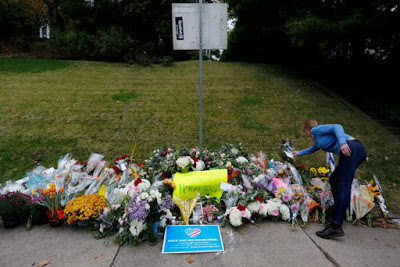Struggling against anti-Semitism is permanently intertwined with the fight against Islamophobia
 |
| Mara Ahmed – October 29, 2018 |
I have been thinking about how to articulate what I feel since the murderous attack on the Tree of Life synagogue, in Pittsburgh, on October 27.
There are the heartbreaking facts of the dead and injured of course, of gun violence and white supremacy, and the particular fascist bent of our current moment. But I’ve been struggling to corral these facts, and more, into a broader, clarifying truth.
I keep coming back to Houria Boutelja’s words that philo-Semitism is the last refuge of white humanism (from her book, “Whites, Jews and Us – Toward a Politics of Revolutionary Love”). Jewish assimilation into whiteness has always seemed like a recent, state-sponsored project to me – something politically expedient and therefore precarious.
I re-read a paper entitled “Judaism, Zionism, and the Nazi Genocide – Jewish Identity Formation in the West between Assimilation and Rejection” by Sai Englert, that was strongly recommended to me by a dear rabbi friend.
The article explains how Zionism and the commemoration of the Holocaust became central tenets of contemporary Jewish identity and how the state has helped forge this identity-formation:
Jewish history and the Nazi genocide are brought to the centre of modern constructions of Western identity and the legitimisation of Western states. However, it is a depoliticised, a-historical, and sterilised version of history, which locks Jews into a specific historic role.
There is once again a trade-off: in order to access the recognition of past wrongs, Jewish communities must relinquish demands for structural justice, and accept that the mass murder of their ancestors be removed from historical and political analysis. Instead, commemoration is turned into a tool behind which Western states can acknowledge and condemn racism, violence, and collaboration, while continuing to mete these out against other communities and countries.
[…] The essentialisation of Jews, at home and abroad, by the state creates a new form of antisemitic rejection. No longer the rootless cosmopolitan, the revolutionary, the internationalist, the Jew today is identified, in the first instance, as – at least potentially – a Zionist, a citizen of Israel, and defender of the ‘West’s values’ in the face of barbarism. No longer the potential destroyer of Western society and bourgeois values but its most fierce protector, antisemitic essentialisation paints the Jew in a seemingly positive light. The underlying logic, however, remains one of a top-down structuring of Jewish identification by the Western state.
As a Muslim, the widely accepted pariah of our time, by the Right but also by substantial passels of Liberals, I was interested in this analysis by Alain Badiou and Eric Hazan, from the same paper:
The aim is to convince people that there is an underlying unity between the support given to the struggle of the Israelis against Arab ‘fundamentalist’ barbarism, and the struggle at home against the young barbarians of the banlieues – whose ‘barbarian’ description is well attested to by the double fact that they are not only Arab or Muslim, but also criticise Israeli government policy.
I was even more struck by the commonalities between Islamophobia and this new, state-licensed form of philo-Semitism/anti-Semitism:
– the idea of static, monolithic identities (the unidimensional Zionist Jew and the unchanging Orientalist caricature of the Muslim),
– the depoliticization of the Holocaust (in order to create the mirage of the humanist West, without challenging its underlying racist/capitalist structures, and mask its violence towards Black and Brown people) and the depoliticization of the Muslim response to invasions and occupations such that all acts of resistance or organized crime become jumbled together into a mass of decontextualized, senseless terrorism),
– finally, the essentialized creation of the perpetual Jewish victim and the irrational, compulsively violent Muslim – both pawns of Western foreign policy, locked in a mythic, ahistorical war.
Palestine is obviously at the center of this battle between the good and bad “other,” with the state intervening frequently to demarcate the borders between those two extremes, e.g. the criminalization of political boycotts against Israel is the drawing of such a regulatory line.
The tragic shooting in Pittsburgh, at least partly motivated by the white extremist killer’s hatred of HIAS (a Jewish American nonprofit that assists refugees) for facilitating the breaching of the U.S. border by Muslim hordes, brings all of these contradictions and ironies to the surface. It shows the instantaneous collapse of divisions between politically constructed categories of sundry others, as soon as whiteness is in crisis.
It begs us to look deeper into the dichotomy between a right-aligned, Trump-friendly Israel and how white supremacy will, of necessity, manifest itself in the U.S.
It forces us to locate the creation of refugees in the context of American imperialism and the perpetual, savage wars that continue to incinerate Muslim-majority countries.
It reminds us of another breaching of borders by desperate refugees – the 1.85 million Palestinians imprisoned in a narrow strip of land in Gaza, who have been engaged in the Great March of Return to demand an end to their 11-year long incarceration. Since March 30, 2018, Israeli forces have killed at least 217 Palestinian protesters and wounded more than 22,000 people.
In the end, it shows us conclusively that there is no room for any form of racism in any movement for justice. There can be no hierarchies of rights justified by preemptive assaults, no dehumanization of the other as a cultural or demographic contaminant, no cataloguing of human beings as collectively expendable. This is why Fred Moten talks about the “irreducible entanglement of blackness and indigeneity” and the “mutually resuscitative, (pre)occupied, blackpalestinian breath.”
The struggle against anti-Semitism is permanently intertwined with the fight against Islamophobia, settler colonialism, and imperial violence and encroachment. It’s not possible to pick apart and support one component versus another, and it’s our decision to commit to all, or nothing.


